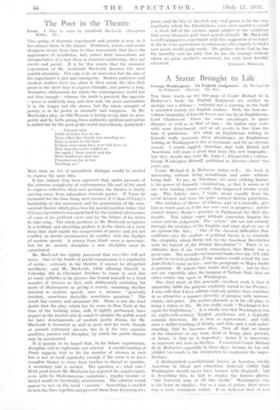The Poet - in - the Theatre Tin!: spring of dramatic experiment
and growth is now, as it has always been, in the inkpot. Producers, actors, and scenic
designers create from time to time movements that have the appearance of revolution, but, unless their innovations are interpretative of a new farce in dramatic authorship, they are sterile and perish. It is for this reason that the dramatic experiment of Mr. Archibald MacLeish deserves the most careful attention. Not only is he an innovator but the aim of
his experiment is just and courageous. Modern audiences and modern readers have too often in their minds the idea that
prose is the short way to express thought, and poetry a long, decorative elaboration for which the contemporary world has not time enough ; whereas the truth is precisely the opposite —prose is relatively long and slow and, the more naturalistic it is, the longer and the slower, but the whole strength of poetry is in its power to intensify and compress. In Mr. MacLeish's play, an Old Woman is trying to say that by pros- perity and by faith sprung from authority spiritual perception is dulled but by the peril of the world marvellously quickened :
" . . . Covered with
Gable of God's love in the Years when the church was standing we Slept in peace in the land.
If there were stars they were hid from us.
Now that the roof's riddled we See again ! Stars march and the Mute indifferent dark has Purposes not for us but Touching us !"
More than an Act of naturalistic dialogue would be needed to express the same idea.
It has, indeed, long been apparent that, under pressure of the extreme complexity of contemporary life and of the need to express collective ideas and passions, the theatre is slowly moving away from naturalism towards poetry. If Yeats be reckoned for the time being hors contours, it is Sean O'Casey's leadership of this movement and his penetration of the com-
mercial theatre which gives him his special position today, but 0' Casey has hitherto been held back by the crabbed adolescence of some of his political views and by the failure of his lyrics to take wing." The whole problem, as Mr. MacLeish recognizes in a brilliant and absarbing preface, is in the choice of a verse form that shall enable the compression of poetry and yet not conflict, as iambic pentameters do conflict, with the rhythm of modern speech. A release from blank verse is necessary, but for its ancient discipline 'a new discipline must be
substituted.
Mr. MacLeish has rightly perceived that vers libre, will not serve. One of the bonds of poetic compression is a regularity of. metre ; certainly in the theatre, it cannot be altogether sacrificed ; and Mr. MacLeish, while allowing himself, as Coleridge did in Christabel, freedom to count in each line as many syllables as he pleases, has bOund himself to a fixed number of stresses or feet, and, deliberately excluding the iamb of Shakespeare as giving a stately,' mounting rhythm inimical to modern speech, uses a measure " generally trochaic, sometimes dactyllic, sometimes spondaic." The result has variety and abundant life. There is not the least doubt that the play, which has its scene in New York at the time of the banking crisis, will, if rightly performed, have impact in the theatre and do much to prepare the public mind for later developments of modern poetic drama, for Mr. MacLeish is dramatist as well as poet, and his work, though at present extremely uneven, has in it the two supreme qualities, passion and discipline, by which the poetic theatre may be reanimated. . .
It is 'greatly to be hoped that, in his future experiments, discipline will be tightened, not relaxed. A careful reading of Panic suggests that to fix the number of stresses in each line is not of itself regularity enough if the verse is to have complete licence to stray from trochee to dactyl or spondee.
A secondary rule is needed. The question is : what rule ? With good reason Mr. MaeLeish has rejected the regular iamb, even with its Shakespearean variations ; regular trochee or
dactyl would be intolerably monotonous. The solutionwould needed
to to rest on the word " caesura." Something is to lock the lines together and prevent them from loosening into
'prose, and the 'key to thelock may well prove to be'the Very regularity which the Elizabethans were most careful to avoid -7a, fixed fall of the caesura, again subject to the variations that every dramatic Poet Must perthit hithself. Mr. MacLeish is well equipped to experiment with this suggestion or to reject it, for he is no pretentious revolutionary who expects to find .a new poetic world ready-made. His preface shows that he has the humility and his • play that he has the courage without which no great aesthetic movement has ever been durably










































 Previous page
Previous page